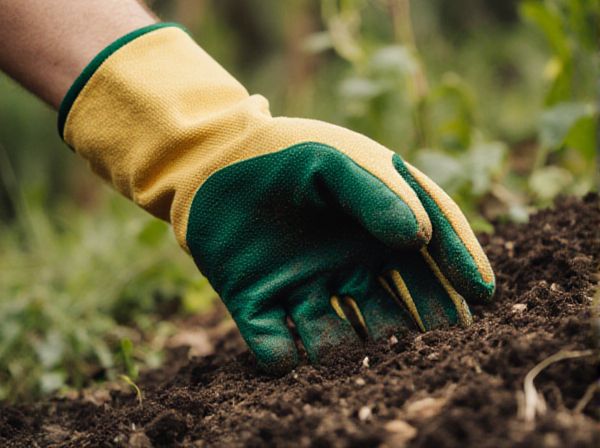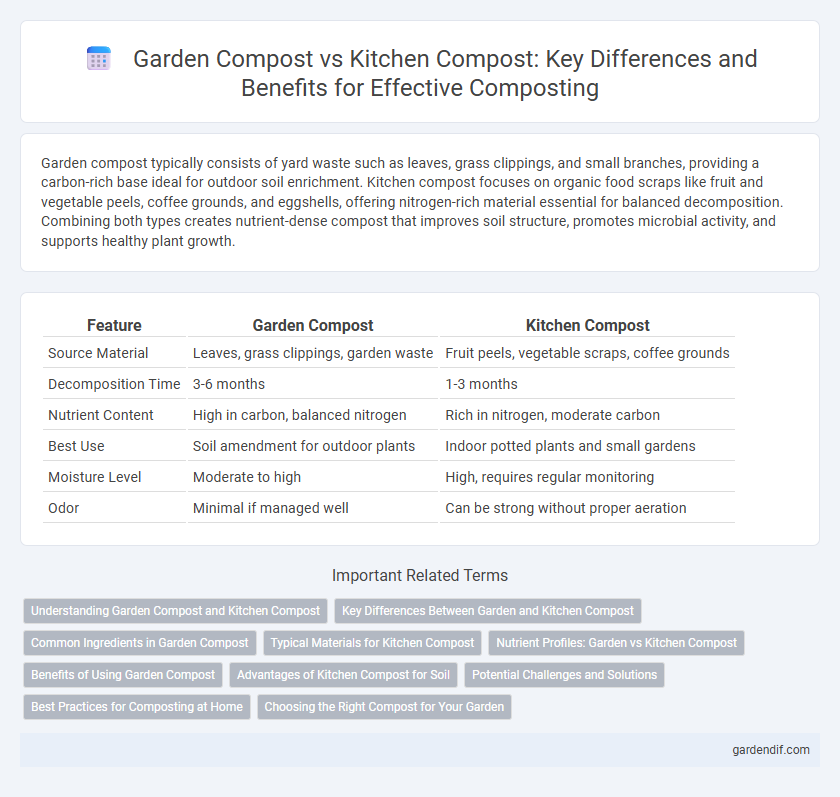
Garden compost vs Kitchen compost Illustration
Garden compost typically consists of yard waste such as leaves, grass clippings, and small branches, providing a carbon-rich base ideal for outdoor soil enrichment. Kitchen compost focuses on organic food scraps like fruit and vegetable peels, coffee grounds, and eggshells, offering nitrogen-rich material essential for balanced decomposition. Combining both types creates nutrient-dense compost that improves soil structure, promotes microbial activity, and supports healthy plant growth.
Table of Comparison
| Feature | Garden Compost | Kitchen Compost |
|---|---|---|
| Source Material | Leaves, grass clippings, garden waste | Fruit peels, vegetable scraps, coffee grounds |
| Decomposition Time | 3-6 months | 1-3 months |
| Nutrient Content | High in carbon, balanced nitrogen | Rich in nitrogen, moderate carbon |
| Best Use | Soil amendment for outdoor plants | Indoor potted plants and small gardens |
| Moisture Level | Moderate to high | High, requires regular monitoring |
| Odor | Minimal if managed well | Can be strong without proper aeration |
Understanding Garden Compost and Kitchen Compost
Garden compost primarily consists of yard waste such as grass clippings, leaves, and small branches, which decompose slowly and enrich soil with essential nutrients. Kitchen compost includes organic food scraps like vegetable peels, coffee grounds, and eggshells that break down faster due to their higher moisture content and nitrogen levels. Understanding the differences in composition and decomposition rates helps optimize composting practices for improved soil health and waste reduction.
Key Differences Between Garden and Kitchen Compost
Garden compost typically involves larger, bulkier plant materials like leaves, grass clippings, and wood chips that decompose over a longer period. Kitchen compost consists mainly of food scraps such as fruit and vegetable peels, coffee grounds, and eggshells, which break down faster due to higher moisture content. The nutrient profile differs as kitchen compost is richer in nitrogen, while garden compost has more carbon, affecting their ideal uses in soil enrichment.
Common Ingredients in Garden Compost
Garden compost primarily contains yard waste such as grass clippings, leaves, branches, and plant trimmings, providing a rich source of carbon and nitrogen essential for soil health. These ingredients promote microbial activity and improve soil structure by adding organic matter and nutrients like nitrogen, phosphorus, and potassium. Common garden compost also benefits from the inclusion of non-woody plant debris and small amounts of soil to enhance decomposition and nutrient cycling.
Typical Materials for Kitchen Compost
Kitchen compost typically includes fruit and vegetable scraps, coffee grounds, eggshells, and tea bags, which provide rich nitrogen content essential for decomposition. Unlike garden compost that often contains yard waste like leaves, grass clippings, and branches, kitchen compost focuses on biodegradable food waste that breaks down quickly. Properly managing moisture and avoiding items like meat or dairy helps maintain a healthy kitchen compost environment.
Nutrient Profiles: Garden vs Kitchen Compost
Garden compost typically contains a balanced nutrient profile rich in organic matter, nitrogen, phosphorus, and potassium, derived from plant debris, leaves, and grass clippings. Kitchen compost is often higher in nitrogen due to food scraps like vegetable peels, coffee grounds, and fruit waste, which accelerate microbial activity and nutrient availability. Combining both types can enhance soil fertility by providing a more diverse and comprehensive nutrient mix for optimal plant growth.
Benefits of Using Garden Compost
Garden compost enriches soil with essential nutrients and improves its structure, promoting healthy plant growth and increased yield. It enhances moisture retention and aeration, reducing the need for chemical fertilizers and watering. Using garden compost supports sustainable gardening by recycling organic waste and fostering beneficial microbial activity.
Advantages of Kitchen Compost for Soil
Kitchen compost enriches soil with essential nutrients like nitrogen, phosphorus, and potassium, promoting healthier plant growth. It breaks down organic kitchen waste such as fruit peels and vegetable scraps, accelerating microbial activity and improving soil structure. This type of compost also helps retain soil moisture and enhances aeration, leading to more fertile and resilient garden soil.
Potential Challenges and Solutions
Garden compost often faces challenges such as managing excessive moisture from rain and controlling pests attracted to decaying plant matter, which can be mitigated by ensuring proper aeration and covering compost piles. Kitchen compost presents difficulties like balancing nitrogen-rich food scraps with carbon materials to prevent foul odors and pest infestations; using a well-maintained compost bin with regular mixing and adding dry materials such as shredded paper helps maintain equilibrium. Both types require monitoring temperature and moisture levels to optimize microbial activity and accelerate decomposition, ultimately reducing waste effectively.
Best Practices for Composting at Home
Garden compost typically consists of yard waste such as leaves, grass clippings, and small branches, providing a balanced carbon-to-nitrogen ratio essential for efficient decomposition. Kitchen compost includes fruit and vegetable scraps, coffee grounds, and eggshells, which are rich in nitrogen and moisture but require careful management to avoid odors and pests. Best practices for home composting involve maintaining proper aeration by turning the pile regularly, balancing greens and browns, and ensuring adequate moisture levels to accelerate microbial activity and produce nutrient-rich compost.
Choosing the Right Compost for Your Garden
Garden compost is rich in coarse organic matter like leaves, grass clippings, and woody materials, providing essential nutrients and improving soil structure. Kitchen compost consists mainly of food scraps such as vegetable peelings, coffee grounds, and eggshells, offering nitrogen-rich content that accelerates decomposition and enriches soil fertility. Selecting the right compost depends on your garden's needs: garden compost enhances soil aeration and drainage, while kitchen compost supplies quick-release nutrients for plant growth.
Garden compost vs Kitchen compost Infographic

 gardendif.com
gardendif.com